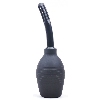Itching in the anus (anal pruritus) is a very common symptom that lasts for a short time in most cases and happens mainly due to excessive sweating, excessive intake of irritating foods to the digestive system or the presence of feces in the anal area.
Symptoms
As explained earlier, anal itching is a common symptom of a number of different diseases and conditions. The range of differential diagnoses is quite large. The first thing to do when the patient has itching in the anus is to look at the area. With a simple inspection it is possible to see if there are injuries, such as fissures or hemorrhoids, worms in the perianal region, diaper rash, warts, signs of bleeding, etc.
In addition to visual inspection, another data that helps to distinguish the cause are the other signs and symptoms that accompany itching, such as pain, bleeding in the stool, frequent diarrhea, lesions in other regions of the skin, etc. Some specific characteristics of certain causes of anal itching that we can highlight are:
- Hemorrhoids often have pain and bleeding associated with itching.
- Rashes can cause pain and intense redness throughout the perianal region.
- Oxyuriasis is more common in children and causes nocturnal itching.
- Dermatological diseases, such as dermatitis, are usually present in other areas of the skin besides the anus.
- Fissures usually cause intense pain at the time of defecation.
- Anal itching caused by stool usually improves shortly after the anus is cleaned.
Treatment
If there are no other associated symptoms and upon visual inspection of the anus no obvious lesion is detected, treatment should be directed towards possible irritation of the perianal region by feces or chemicals.
Therefore, the initial treatment consists of improving anal hygiene, preventing the region from becoming wet, removing substances and products that may be aggressors, modifying the diet and protecting the skin with ointments based on zinc oxide, such as Hipoglós, or vaseline. .
Cleaning the anus should be done with water (in a bidet or with showers) after each bowel movement, and throughout the day with disposable wet wipes whenever the anus is itchy more intense. Hygiene should be done gently so as not to increase skin damage. Avoid cleaning products, especially scented ones.
Increased fiber intake makes the stool more shaped and healthy, reducing straining and possible mucus leakage from the anal sphincter.
To keep the area low in moisture, after cleaning, the area can be dried using a hair dryer on low heat. Regarding clothes, give preference to light fabrics, such as cotton, and avoid clothes that are too tight so as not to cause a lot of perspiration.
Avoid scratching the anus as much as possible, as this tends to worsen irritation and injuries. If you scratch your anus without realizing it while you sleep, keep your nails well trimmed and sleep with cotton gloves to reduce injuries. If anal itching has an obvious cause, such as worms, hemorrhoids or dermatological diseases, treatment should be directed towards these diseases and should be done with medical advice.














